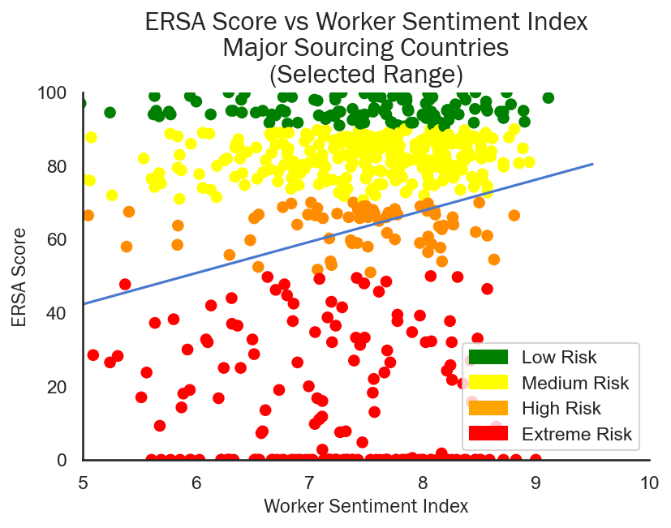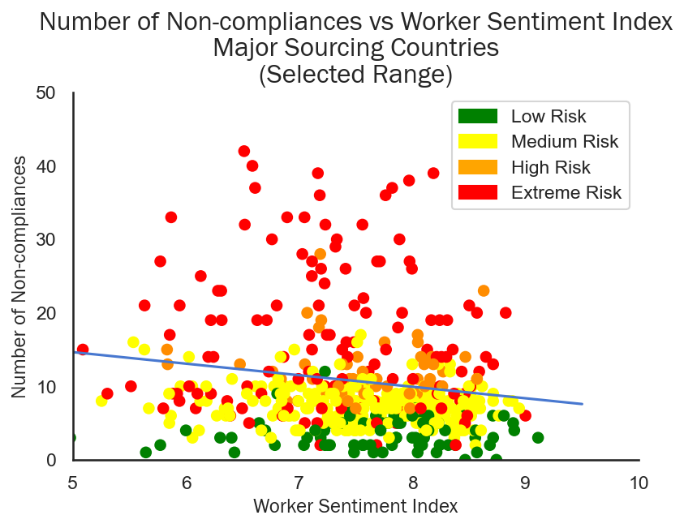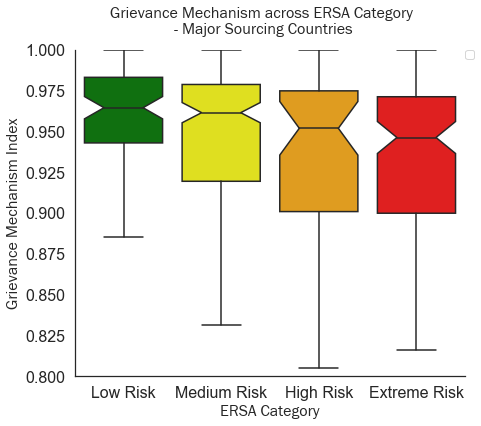Evolution of Audits: Worker Sentiment Survey Index surfaces insights on factory risk and resilience
Worker voice surfaces supply chain violation and resilience risks directly from workers
The need for increased visibility of social compliance and resilience risks in supply chains is growing; and has been further exacerbated by COVID-19, concerns relating to vulnerable workers and growing geopolitical tensions. Yet traditional tools like standard social compliance audits have proven more challenging to implement when travel is compromised. They also struggle to capture all types of sensitive information from workers.
ELEVATE’s use of worker voice technologies is able to bridge some of these concerns by collecting anonymous viewpoints directly from workers. Thus, enabling companies to effectively pick up insight into potential violations directly from workers and expose hidden problems at factories and other facilities. This valuable data source provides companies with an extra layer of worker perception information and heightened supply chain transparency.
Our findings from the world’s first integrated audit and worker survey tool
In 2018, ELEVATE launched the first integrated audit + technology-supported worker surveys. These services support a scalable approach to surface more reliable worker insights. This Worker Sentiment Survey has now collected the views of over 92,000 workers at more than 2,000 factories in 12 countries. These are some of our findings …
The Worker Sentiment Index is a strong indicator of factory risk
The Worker Sentiment Index represents the factory worker sentiment in a quantifiable way by evaluating worker viewpoints across five survey categories: Grievance Mechanism, Work Atmosphere, Wages and Hours, Production Efficiency, and Workforce Stability[i].
ELEVATE analysis shows a strong positive relationship between the factory ERSA performance (ELEVATE’s Responsible Sourcing Assessment rating) and the Worker Sentiment Index, scaled from 0 (lowest sentiment) to 10 (highest). This means that factories with higher worker sentiment are more compliant than those with low worker sentiment scores. Similarly, the number of factory non-compliances shows a mild drop as the Worker Sentiment Index increases. This tells us that riskier factories signaled by the Worker Sentiment Index usually have more non-compliance issues and that worker sentiment could be a leading indicator of factory risk and resilience.


ELEVATE analysis also shows a positive relationship between the Grievance Mechanism Index (a subset of Worker Sentiment Survey responses) and the overall factory ERSA performance category. This correlation illustrates that factories that implement effective internal grievance mechanisms are also more compliant, resulting in a higher audit rating. Workers at factories with effective grievance mechanisms are also three times more likely to report that they plan on staying at the factory for a year. This means that effective internal communication channels can improve workforce stability and resilience to wage competition.

The above predictions conclude that factories are more likely to be compliant when they
provide workers with a better work environment and trusted internal grievance channels.
“The relationship between effective grievance mechanisms and a factory’s level of compliance is important because it indicates an opportunity to use Worker Sentiment Surveys (WSS) deployed remotely to help predict factory conditions even when it’s not possible to go on-site, e.g. from COVID-19 travel restrictions. WSS can also be used to quickly vet new suppliers during the onboarding process when there is limited time for travel and on-site audits”
– Margot Sfeir, Director Client Services, ELEVATE
While worker voice data predicts factory riskiness and reveals violation signals, it still has limitations. Worker voice provides perception data on violation signals; it does not provide verified violation evidence in the same way that audits do. Therefore, ELEVATE recommends that worker voice is ideally complemented by social auditing to provide the most comprehensive factory compliance assessment.
How you can use worker voice technology to improve supply chain transparency
Worker voice can be a great source of revealing sensitive but serious violation signals. Yet, companies are just starting to integrate it with responsible sourcing in a meaningful manner. Many companies have experimented with worker voice but without a clear strategy. Some may have set ambitious worker voice targets without a clear roadmap in achieving them.
This data indicates a few specific strategies that companies can use to leverage worker voice for improved transparency:
- Vet new or existing suppliers, especially when travel is restricted. Remote worker surveys can predict audit performance and complement on-site visits.
- Detect sensitive issues not easily found through other means. This includes sexual harassment, forced labour, and unethical recruitment practices.
- Surface real-time insights from workers 365 days a year. Through follow-up surveys, worker apps, and grievance channels, companies can shift to a more dynamic model of supply chain intelligence.
ELEVATE is the leading business risk and sustainability solutions provider that helps companies explore the full capacity and capability of worker voice technology with our proprietary Laborlink technology, WorkerApp, and 10 years of related industry knowledge and experience. ELEVATE offers 360° assessment tools to deliver improved organisational performance through sustainability and supply chain assessment, consulting, program management and analytics. ELEVATE Analytics team leverages data collected from our products and service to help companies enhance supply chain transparency and mitigate forthcoming supply chain risks.
Contact ELEVATE for more information on the worker surveys and assessments.
Disclaimer: These blogs are written by ELEVATE staff members or associates and the views and opinions expressed are not necessarily those of ELEVATE.
[1] The 5 dimensions of a Worker Sentiment Survey include (1) Grievance Mechanism – to assess the degree of effectiveness of internal grievance mechanism (2) Work Atmosphere – to identify the potential risk of harassment and other gender-related issues (3) Wages and Hours – to understand workers’ sentiment on critical compliance topics (4) Production Efficiency – to gather business-relevant insight that helps identify opportunities for improvement and (5) Workforce Stability – to gauge workers’ overall satisfaction level including Employee Net Promoter Score.
About the authors

